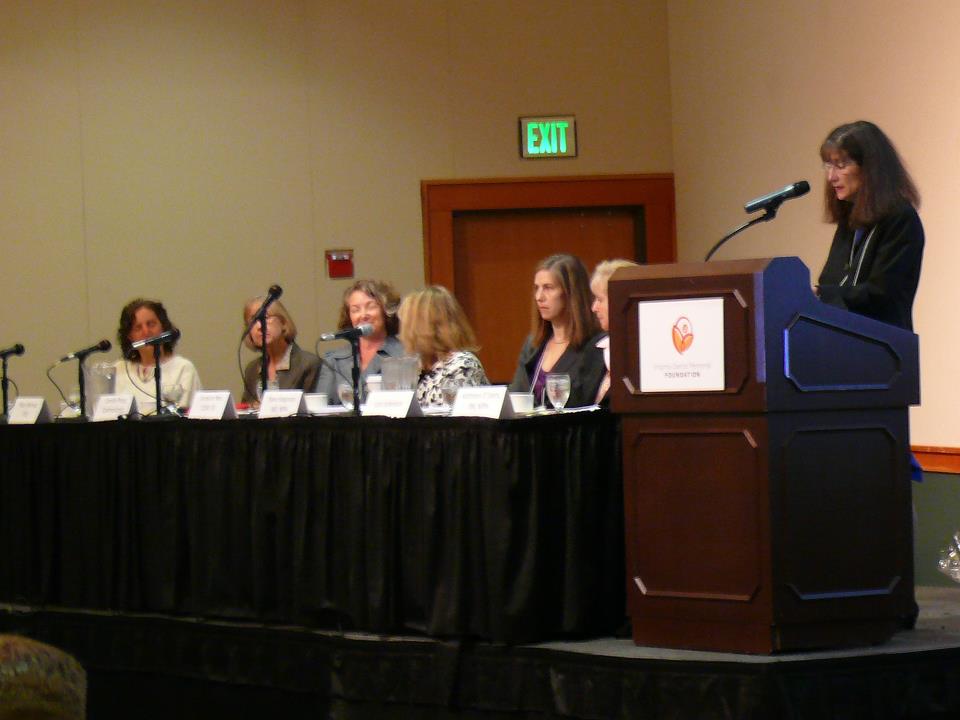May 2, 2012 -- Good health is more than individual choices, said Kathleen O'Leary, public health administrator for Washington County, addressing a crowd of more than 300 people at the Virginia Garcia Memorial Foundation's Fourth Annual Health Care Symposium yesterday in a conference hall at the Oregon Zoo.
O'Leary and the event's five other speakers addressed the theme of this year's symposium – the social determinants of health – from several perspectives: local business, food security, safe and affordable housing, access to education, access to mental healthcare and the primary care delivery model.
 Lori Sobelson, the director of community outreach for Bob's Red Mill, told the story of the business, which began with Charlee Moore's commitment to feeding her children healthy foods, including whole grains – before it was a popular concern.
Lori Sobelson, the director of community outreach for Bob's Red Mill, told the story of the business, which began with Charlee Moore's commitment to feeding her children healthy foods, including whole grains – before it was a popular concern.
“He didn't go into the business to make money,” Sobelson said, noting the company's long history of profit-sharing with employees and the fact that it's now employee-owned – as well as the Moores' recent efforts to fund nutritional research. “He went into the business to take care of people.”
Dr. Dana Hargunani, the child health director for the Oregon Health Authority and a member of the Childhood Hunger Coalition, talked about how food insecurity affects the overall health picture for children in Oregon.
“We have the unfortunate distinction of being a leader in food security,” Hargunani said. Children who don't have consistent access to healthy foods are likely to develop health problems and poor eating habits later on, she said.
Providers also need to recognize the effects of food insecurity on the whole family, she added. Parents in struggling families will often skip meals themselves to ensure their children have enough to eat – which affects the family dynamic as well as the parents' health, as well as fetal development if pregnant women are skipping meals.
“The conditions in which we live have an enormous impact on our health, long before we need care,” said Jerralynn Ness, the executive director of Community Action serving Washington County. “I can tell you, and my staff can tell you: being homeless is bad for your health.”
Living in housing that's both affordable and safe is critical to maintaining health, Ness said, adding that often spaces designated as “affordable housing” are still too expensive for many people to rent without giving up on other basics, like heat and electricity. Between January and April of this year, her agency received 122,000 requests for heating assistance: “This is in Washington County, the wealthiest county in the state.”
Camille Preus, the commissioner of the Oregon Department of Community Colleges and Workforce Development, talked about the link between the level of education, healthy choices and longevity, and the state's goal of increasing graduation rates. “Education attainment is really a proxy for economic utility and, I know now, a strong social determinant of health,” she said.
People with mental illness often struggle with physical health problems as well, said Mary Monnat, CEO and president of LifeWorks NW. Her agency has been partnering with Virginia Garcia Memorial Health Center since 2003, when Oregon Health Plan patients lost their mental health coverage.
Patients at Virginia Garcia clinics who suffer from chronic health conditions now have a licensed clinical social worker as part of their team, which not only helps the patient manage stress and make better choices, but “normalizes” mental health services, which are still stigmatized, especially in certain cultural groups.
“I take it for granted that if I want to do something, it can happen,” said Dr. Inge Hindel, the event's final speaker, who’s been seeing patients at Virginia Garcia for 15 years
Advocating in schools, partnering with environmental groups – since many patients work at jobs where they are exposed to farm or cleaning chemicals – and even getting involved in seemingly unrelated projects, like arts organizations, have also had an impact on people’s health, she said.
Image courtesy of Virginia Garcia Memorial Foundation.